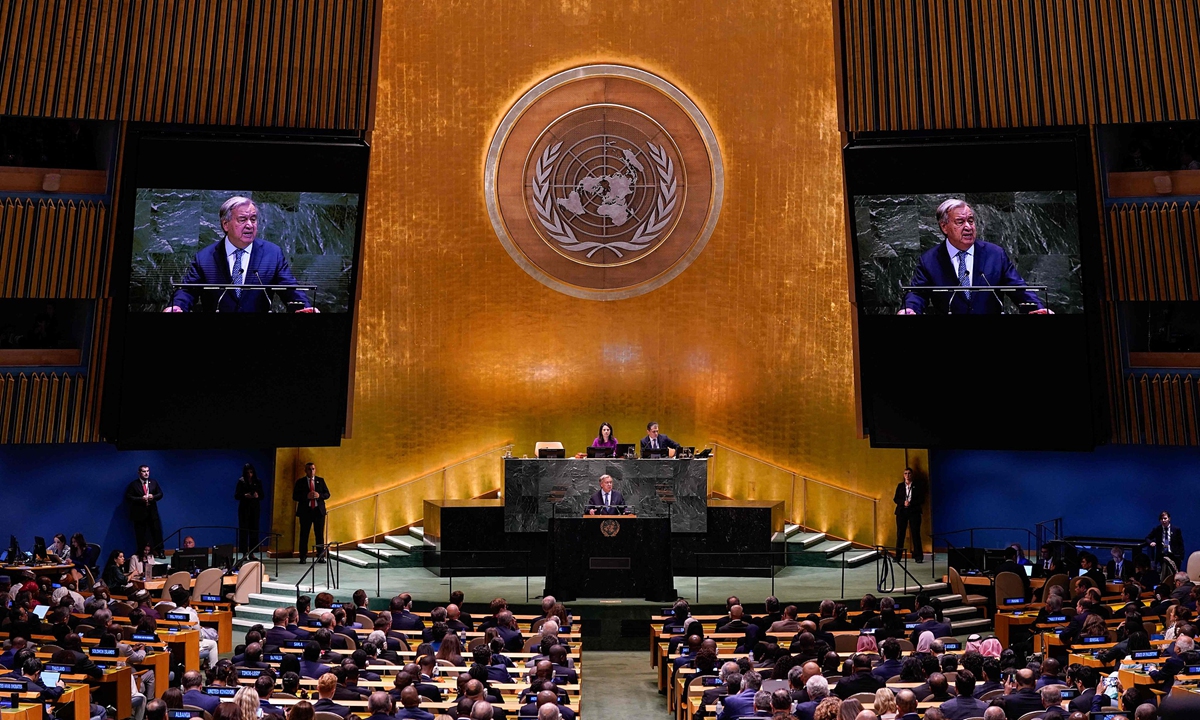
The general debate of the 80th Session of the United Nations General Assembly (UNGA) is taking place at the UN Headquarters in New York from Tuesday to next Monday, featuring speeches from global heads of state and governments to discuss the world’s most pressing problems amid rising global challenges and urgent calls for renewed multilateral action.
Nearly 150 heads of state and governments are gathering in New York this week, alongside thousands of officials and diplomats, as the UNGA’s high-level week commences at a difficult time in the organization’s 80-year history.
According to the UN, on Tuesday morning local time, opening speeches by the UN secretary-general and president of the general assembly are scheduled to be followed by speeches from Brazilian President Luiz Inacio Lula da Silva and US President Donald Trump.
During his opening speech at the general debate of the UN General Assembly, UN Secretary-General Antonio Guterres said that “We have entered into an age of reckless disruption and relentless human suffering. Look around. The principles of the United Nations that you have established are under siege. Listen. The pillars of peace and progress are buckling under the weight of impunity, inequality and indifference,” Al Jazeera reported.
“What kind of world do we choose to build together, excellencies? We have our work cut out for us as our ability to carry out that work is being cut from us,” he said.
During the speech, President Lula addressed Israel’s war on Gaza, said “the terrorist attacks perpetrated by Hamas are indefensible from any angle, but nothing, absolutely nothing, justifies the ongoing genocide in Gaza,” AL Jazeera reported. He added that the Palestinian people are at risk of disappearing. They will only survive with an independent state integrated into the international community.
In terms of Trump’s speech, according to Al Jazeera, The US president has hailed his role in attempting to reach ceasefires in conflicts across the world. Trump told world leaders his track record, for which he says he deservers a Nobel peace prize, underscores the ineffectiveness of the UN.
The US president’s return to the UN rostrum coincides with multiple media coverage of the US’ substantial unpaid dues. As The Washington Post highlighted in a report on Monday, “Trump starves [the] UN of funding, as global body faces cash crunch.” Similarly, a Bloomberg report was headlined “Trump heads to UN gathering facing billions in unpaid dues.” The report said the US has accrued over $3 billion in arrears.
Bloomberg noted that If the US keeps refusing to pay up, the country could lose its vote at the UNGA. The UN charter stipulates such a punishment for countries whose arrears exceed the amount they were supposed to pay in the previous two years.
Chinese analysts believe the US government will have to confront a complex scenario at the UNGA. The New York Times reported Monday that leaders from across the globe convened in New York to support Palestinian statehood, over opposition from Israel and the US, as the Gaza Strip neared the two-year mark of a war that has brought mass death, destruction and hunger.
France and several other Western nations formally declared their recognition of a Palestinian state at the UN on Monday, as the UK, Canada, Australia and Portugal declared recognition over the weekend, according to media reports.
The recognition of the state of Palestine by more countries not only affirms the historical legitimacy of the Palestinian people’s right to exist but also upholds the authority of the UN-centered international system, Su Jingxiang, emeritus research fellow at the China Institutes of Contemporary International Relations, told the Global Times on Tuesday.
This reflects the shared determination of the international community to promote a just resolution to the Israel-Palestine conflict, the expert said.
These hot-button issues have highlighted the deficits in global governance, according to Chinese analysts.
The world is entering a new period of turbulence and transformation, and global governance has reached a new crossroads, presenting a crucial juncture for reflecting on global governance, Wang Huiyao, founder and president of think tank the Center for China and Globalization (CCG), told the Global Times.
Against this backdrop, China has put forward the Global Governance Initiative (GGI), offering a timely and concrete path forward, Wang said.
At the recent “Shanghai Cooperation Organization Plus” Meeting in Tianjin, Chinese President Xi Jinping proposed the GGI on September 1.
At the upcoming multilateral and bilateral events, Chinese Premier Li Qiang will elaborate on how China views the current international landscape, major global issues and the work of the United Nations, and will share in detail China’s domestic and foreign policies as well as the GGI and other important visions and proposals, Xinhua reported on Tuesday.
According to Xinhua, Li landed in New York on Monday afternoon to attend the general debate of the 80th session of the United Nations General Assembly.
Through the premier’s trip, China hopes to join all parties in renewing the founding mission of the United Nations to reaffirm the commitment to the purposes and principles of the UN Charter, revitalize the United Nations’ authority and vitality in the new era and enable the organization to play an even bigger role in safeguarding world peace, promoting development and building a community with a shared future for humanity, a Chinese Foreign Ministry spokesperson said.
